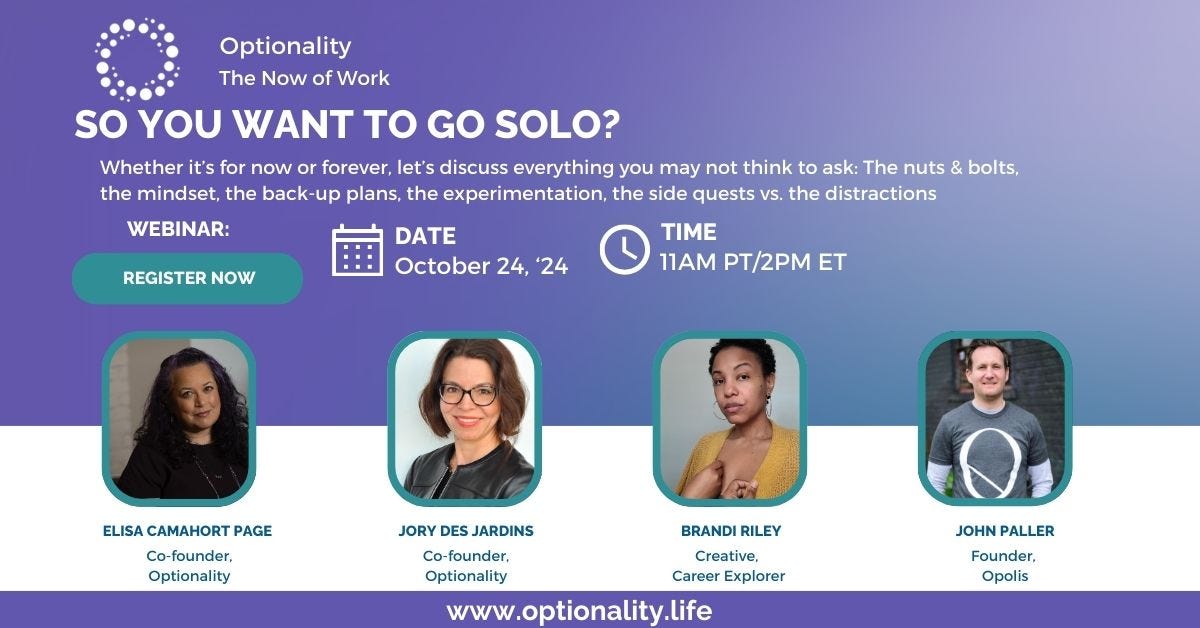This is the first of Jill’s series for Optionality designed to help formulate and execute a career transition.
Lately, I’ve met many people questioning their career choices. Work isn’t working for many of us. When I have conversations with the Gen Z’s in my world, they are pretty emphatic about how they will work and what they won’t stand for, I am totally envious of them.
As a Gen Xer, developing that gene took me a long time. The gene of, um, “No, I won’t do that for you, but I will do this instead.” We want a meaningful, rewarding, and challenging career, yet we are no longer interested in trading our health, well-being, or personal life as part of the deal.
You're good at what you do—really good. But, suddenly, you’re questioning your career choices, which often leads to a career identity crisis. It's easy to spin when you're in the middle of one.
You need change, but finding the right direction can seem overwhelming. Maybe there’s some guilt mixed in there too, because you’ve invested so much time and money into honing your skills. Your job has become your identity. You’ll disappoint everyone, including yourself, if you switch, right?
What will you do with all that training and experience? How do you weave it into what’s next?
You may find yourself swinging wildly between extremes—struggling to understand why you’re miserable at your job, craving more free time, more money, intellectual stimulation, or simply better leadership.
The antidote to a career identity crisis is to design a career strategy.
To slow down the pendulum, you’ll probably want to list what you want in the next gig and what you want to leave behind.
I’m going to suggest another approach.
Start by defining what you want to keep.
When you're facing a career identity crisis, most people immediately think about what they don’t want in their next job. For many, this is solving the problem from inside the issue. It can feel stressful and frustrating. And you are creating what’s next from feelings of stress and frustration.
Instead, I ask you to consider what you want to keep from your current role or past experiences. We don't want to throw away the 60% that’s good to find the 40% that’s missing. This positive framework calms the mind and helps you think more strategically. Evolutionary biology teaches us we can’t be in a negative mental space and still be strategic. The zebra isn’t negotiating with the lion. It’s in a panic sprint. Allow the negative emotion to pass before you make any decisions.
Then, make a list of all that’s good in your current role to build what you want in the next gig.
Next, look at your non-negotiables.
What are the things that you must have in your next experience? The approach to life-work integration, meaningful work, and compensation are important. Cultural fit is essential. Think about the personalities you’ve worked with that made your work experience positive. Whether you value humor, intellectual rigor, or teamwork, identifying this can help you develop the questions you’ll want to ask to determine if the opportunity aligns with your preferences.
Example: You might want to work in an environment similar to a fun yet intellectually stimulating workplace, like the charm of Abbott Elementary combined with the sharp, cerebral exchanges from The Newsroom. Think about the questions you might ask to suss out if there’s a fit.
What skills energize you?
Skills are acquired through time and effort. What core skills do you want to bring into your next role?
The flaw with most job interviews (and resumes!) is they focus on what you did. They are a status report. The interviewer wants to know what you are going to do in the future.
Think about the skills you want to build on as an individual contributor and those you’ve honed in leadership positions. These capabilities should energize you and make you feel engaged and empowered. Knowing what skills give you energy and you want to keep using will help you narrow down the roles where you can thrive.
Example: A non-profit Executive Director has spent her career in fundraising and grant writing. She hates grant writing. So, she will only focus on fundraising skills, in her conversations, and opportunities. You may love strategic problem-solving and hate mentoring a team. Note them. These are skills you’ll want to seek out in future roles.
Strengths
Your strengths are distinct from your skills. They are the natural talents and capabilities that allow you to excel. Reflect on which strengths are core to you and how they’ve contributed to your success. These are the areas you should prioritize going forward.
Example: You might be a strong communicator who can explain complex concepts clearly but hate researching. Focusing on a role that ensures collaboration and a data counterpart will help you flex your strategic storytelling and drive personal satisfaction.
Reciprocal values
Your values are essential to long-term career satisfaction. Consider the types of environments where you felt most aligned with the company's mission and culture. Think about reciprocity—what do you want from your employer, colleagues, partners, or investors?
Example: I value creativity and innovation. I could give a hoot if my colleagues and investors share these values. However, if my direct partner doesn’t share these values, I will be in conflict all day. I value collaboration. My team must too. Understanding values and at what level of reciprocity you require is vital to determining a fit.
OPTIONALITY MEMBERS: On October 10 an email request was sent asking you to kindly take 10 minutes to tell us what about Optionality is working for you. For your efforts we will offer one-year extensions on annual premium memberships (now priced at $499) to three lucky members who complete the survey by October 31st. Your custom link to the survey is included in the email. Check that Spam folder! And thanks for being a member.
Checking in with yourself
When you are stressed, it's tough to listen to your gut or know what you want to do next. I recommend paying attention to "gems" — those insightful, sometimes unexpected pieces of wisdom that emerge in conversations—focusing on extracting actionable insights or valuable lessons, often hidden in offhand remarks or underlying themes.
Get your notes app, or a journal and write it down. I have a journal titled “Best Thoughts.” This repository of ideas and thoughts is vital when seeking inspiration or reconnecting with my gut. These "gems" can spark creativity, innovation, or new ideas. They can help you get out of the I Don’t Knows and into the What-Ifs. They are delicious, unexpected pieces of wisdom that emerge during conversations or moments of reflection.
Action Item: Keep a journal or open your notes app to document these “gems.” Recording your thoughts helps capture fleeting moments of clarity, creativity, or inspiration. Over time, this journal can become a valuable tool to help you remember your best thoughts and ideas, especially when you feel stuck and need help shifting your mindset. Gems might nudge you toward a new direction or help you refine your current path.
It’s all about strategy.
As you search for your next career move, remember you need a strategy. Consider what you want to keep focusing on what you like about your current situation—design your strategy to include your strengths, skills, values, and preferences to guide your search.
Keep checking in with yourself, and be mindful of the pendulum swings and the impulsive decisions. Documenting your insights, delaying decisions when you feel anxious, and getting clear in your strategy is how you create a career path that feels fulfilling, sustainable, and aligned with who you are today.
Jill Griffin is a career strategist and executive coach. She began her journey as a media executive and innovation leader for top brands. However, a head injury forced her to reevaluate her life and career purpose. She then transitioned into helping others navigate their career trajectories. Host of The Career Refresh podcast, Jill has spent the past eight years guiding hundreds of professionals in finding and pursuing fulfilling later-stage career paths.








